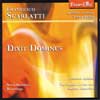Scarlatti, F Dixit Dominus
The unknown Scarlatti receives enthusiastic treatment but he can’t match the relatives
View record and artist detailsRecord and Artist Details
Composer or Director: Francesco (Antonio Nicola) Scarlatti
Genre:
Vocal
Label: Deux-Elles
Magazine Review Date: 13/2004
Media Format: CD or Download
Media Runtime: 79
Mastering:
Stereo
DDD
Catalogue Number: DXL1096

Tracks:
| Composition | Artist Credit |
|---|---|
| Miserere mei, Deus |
Francesco (Antonio Nicola) Scarlatti, Composer
(The) English Cornett and Sackbut Ensemble Armonico Consort Christopher Monks, Conductor Concerto Gallese Emma Kirkby, Soprano Francesco (Antonio Nicola) Scarlatti, Composer |
| Dixit Dominus |
Francesco (Antonio Nicola) Scarlatti, Composer
(The) English Cornett and Sackbut Ensemble Armonico Consort Christopher Monks, Conductor Concerto Gallese Emma Kirkby, Soprano Francesco (Antonio Nicola) Scarlatti, Composer |
| Messa |
Francesco (Antonio Nicola) Scarlatti, Composer
(The) English Cornett and Sackbut Ensemble Armonico Consort Christopher Monks, Conductor Concerto Gallese Emma Kirkby, Soprano Francesco (Antonio Nicola) Scarlatti, Composer |
Author: Lindsay Kemp
Details are sketchy of the life of Francesco Scarlatti – younger brother of Alessandro and uncle of Domenico – but what we do know suggests that it was one untouched by major success. Born in Palermo, he went to Naples to play under his brother as a violinist at the vice-regal court (upsetting jealous locals in the process), travelled around a bit (two oratorios and an opera were performed in Rome in the early 1700s), moved to London, and ended up in Dublin. Applications along the way for the jobs of maestro di cappella at Milan Cathedral and assistant Kapellmeister at the Imperial Court in Vienna both failed, and it seems the Irish stage of his life, at least, was marred by illness and marital unhappiness. His death, presumably in Dublin in the 1740s, is unrecorded.
It would be nice if these première recordings of three of his large-scale sacred works revealed him to be an unjustly neglected master, especially if he were one who possessed something of the talent and individuality of either of his more famous relatives. Alas, it is not really so. Francesco was certainly a competent enough composer of church music, one who on this evidence slipped easily into the grandiose and dignified polychoral style for voices and instruments favoured in Rome around 1700. But while one can imagine it resounding with suitably thrilling effect round the spaces of a Baroque church, its pleasures are more of the senses than the mind; the 16-part choral textures of Dixit Dominus and the Messa can throw up some delicious solo-voice combinations, but the music’s gestures rarely surprise.
They get sympathetic and enthusiastic performances here, though. The Armonico Consort are a young-sounding choir, to which Emma Kirkby’s soprano adds a radiant top-line focus, and while some of the solo voices can be a bit shaky in places, as a unit this is a well-marshalled team under Christopher Monks, who shows a sure hand for style and a sound grasp of the music’s shape. The nicely balanced recording, made in Douai Abbey, is pleasingly (if slightly muddyingly) resonant.
It would be nice if these première recordings of three of his large-scale sacred works revealed him to be an unjustly neglected master, especially if he were one who possessed something of the talent and individuality of either of his more famous relatives. Alas, it is not really so. Francesco was certainly a competent enough composer of church music, one who on this evidence slipped easily into the grandiose and dignified polychoral style for voices and instruments favoured in Rome around 1700. But while one can imagine it resounding with suitably thrilling effect round the spaces of a Baroque church, its pleasures are more of the senses than the mind; the 16-part choral textures of Dixit Dominus and the Messa can throw up some delicious solo-voice combinations, but the music’s gestures rarely surprise.
They get sympathetic and enthusiastic performances here, though. The Armonico Consort are a young-sounding choir, to which Emma Kirkby’s soprano adds a radiant top-line focus, and while some of the solo voices can be a bit shaky in places, as a unit this is a well-marshalled team under Christopher Monks, who shows a sure hand for style and a sound grasp of the music’s shape. The nicely balanced recording, made in Douai Abbey, is pleasingly (if slightly muddyingly) resonant.
Discover the world's largest classical music catalogue with Presto Music.

Gramophone Digital Club
- Digital Edition
- Digital Archive
- Reviews Database
- Full website access
From £8.75 / month
Subscribe
Gramophone Full Club
- Print Edition
- Digital Edition
- Digital Archive
- Reviews Database
- Full website access
From £11.00 / month
Subscribe
If you are a library, university or other organisation that would be interested in an institutional subscription to Gramophone please click here for further information.




